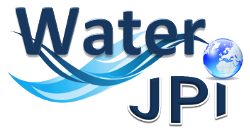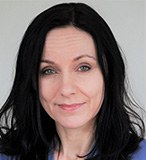Keynotes and invited experts at a glance
Professor Barbara Kasprzyk-Hordern comes from the University of Bath, UK, where she leads the Environmental Chemistry Group. Their principal research interests fall into the three interrelated research areas of environmental, analytical and water sciences. The group is especially interested in water pollution and novel technologies used to decrease contamination of water as well as urban water and human epidemiology.
Questions presented to Barbara Kasprzyk-Hordern – and her answers:
Affiliation information? Professor in Environmental and Analytical Chemistry in the Department of Chemistry, University of Bath, United Kingdom
What brought you to your current position? Genuine passion for furthering knowledge and strong desire to make our environment better for all.
What do you see as the biggest water-related transboundary challenge? It’s easier to do research globally than ever before but it is still difficult to get research enabling global partnerships funded. This also concerns interdisciplinary research as many focus on narrow aspects and do not engage with the process holistically.
What is the added value of international cooperation in solving water-related challenges? International collaboration is paramount to the success of projects trying to tackle water challenges.
What are the most crucial research needs in terms of emerging pollutants? We need to engage more with interdisciplinary research, cross research boundaries to provide more comprehensive, less target driven risk assessment.
What role do lakes and rivers have in your life? I grew up next to a river. Water runs through my veins!
Keynote speaker Professor Fiona Regan will focus on Technical solutions and strategies to monitor and reduce pollutants.
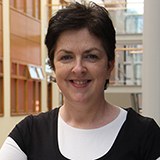
Fiona Regan is Professor in Chemical Science at Dublin City University and Director of the DCU Water Institute. Her research focuses on environmental monitoring and she has a special interest in priority and emerging contaminants as well as the establishment of decision support tools for environmental monitoring using novel technologies and data management tools.
We asked Professor Regan to tell us about herself and what water means to her professionally and in everyday life.
Affiliation information? Director, DCU Water Institute, School of Chemical Sciences, Dublin City University, Glasnevin, Dublin, Ireland.
What brought you to your current position? I studied Environmental Science and Technology and later completed a PhD in analytical chemistry in 1994. In 1996 I took up a lecturing position at Limerick Institute of Technology. In 2002 I joined the School of Chemical Sciences as a lecturer in analytical chemistry, in 2008 I became senior lecturer and in 2009 became the Beaufort Principal Investigator in Marine and Environmental Sensing. I established the DCU Water Institute at a time when water governance and management in Ireland was experiencing huge challenges and in a backdrop of a global water scarcity and quality crisis. There are real opportunities for leaders to change the way that we manage our water to provide a clean, safe and secure resource for everyone.
What do you see as the biggest water-related transboundary challenge? As the world’s population and economy grow, there will be an increase in pressure on water resources. For many years the World Economic Forum has identified the global water crisis as one of the top three risks. It is really critical that we can identify ways that we can share this really important freshwater resource. Water management is an issue of policy and governance the world over and we all need to work together to ensure a safe, secure water resource for everyone.
What is the added value of international cooperation in solving water-related challenges? Because of the cross-border nature of water we must strive to cooperate in order to achieve good water management and governance. Things like water pollution and flooding are scenarios that do not stop at borders and therefore we need to work together to solve these problems. Also, water scarcity is a growing concern that we can only learn from colleagues who are experienced in these areas and have been developing solutions for decades to combat scarcity.
What are the most crucial research needs in terms of emerging pollutants? Emerging pollutants are a topic of concern because of the growing numbers of chemicals in our waters and the lack of knowledge of their impact on human and ecosystem health. The current monitoring approaches deal only with spot sampling and do not consider the synergistic effects, the toxicity of chemicals, their level of occurrence and residence time in the environment. Research is needed to establish new and innovative monitoring approaches that take into account the toxicity of the water in relation to the occurrence of emerging contaminants. We need to understand the breakdown of the chemicals and the effects of these metabolites or degradation products. A strong approach linking sources of the chemicals and their occurrence in freshwaters is needed along with a study of toxic effects.
What role do lakes and rivers have in your life? As Director of the DCU Water Institute I think about the aquatic ecosystem every day and the importance of this resource in our lives in Ireland and across the world. We all have a role to play in managing this resource for the benefit of everyone on the planet. Understanding the value of the resource is key to that. In Ireland you are never far from rivers and lakes. Our freshwater forms our landscape and provides an important resource for drinking water and leisure. My research brings me to rivers and lakes frequently where I deploy sensors, monitor water quality, test our new sensors for e-coli and nutrients and teach students about aquatic chemistry. Flooding in Dublin is influenced by the rivers in this city and we are interested in studying how our rivers here respond to the new challenges of climate change effects on our rainfall.
Invited speaker Seppo Rekolainen
Seppo Rekolainen is the Director of International Water Cooperation at the Finnish Ministry of Agriculture and Forestry and the Vice-Chair of Water JPI Scientific and Technological Board.
We asked Seppo Rekolainen to tell us about himself and what water means to him professionally and in everyday life.
Affiliation? Ministry of Agriculture and Forestry, Finland.
What brought you to your current position? I have always been interested in international water issues, both from research and governance point of view. My position in the Ministry of Agriculture and Forestry provides an excellent opportunity to get more acquainted and also to have some impact on water governance internationally.
What do you see as the biggest water-related transboundary challenge? The very basic issues are lack of trust, and due to that lack of political will. Very often full sovereignty is seen more important that cooperation with neighboring countries sharing the same water resources. The benefits of cooperation is maybe not fully understood are neglected.
What is the added value of international cooperation in solving water-related challenges? In case of shared waters, the benefits are often more clear to downstream countries: more equitable water allocation for various uses, less polluted waters etc. But also upstream countries may benefit, e.g. better economic and social development, reduced risks caused by weather extremes, better living conditions for migratory wish, and avoiding conflicts and increased migration. For example, in case of Syria, one of the root causes of the present crisis have been droughts and lacking cooperation with upstream countries, who now suffer for huge amount of exiles.
What are the most crucial research needs in terms of emerging pollutants? Measures how to reduce the use of such pollutants and how to keep them away from soils and waters.
What role do lakes and rivers have in your life? They provide me life and fun.
Panelist Dr. Nonhlanhla Kalebaila
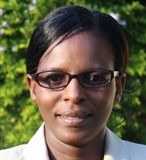
Dr. Nonhlanhla Kalebaila is a Research manager at the Water Research Commission (South Africa) and holds a PhD in Chemical technology. Dr. Kalebaila is responsible for a portfolio of research on water supply, quality and treatment technology. Under this portfolio is a dedicated research programme on water quality and emerging contaminants.
We asked Dr. Kalebaila to tell us about herself and what water means to her professionally and in everyday life.
Affiliation information? Water Research Commission, South Africa. The Water Research Commission is a national public agency responsible for stimulating and funding research, as well as providing a strategic direction on water related matters.
What do you see as the biggest water-related transboundary challenge? Water stress due to a decline in water quality (and availability of usable water) is one of the significant challenges in inter-state water relations, and more so, where there are discrepancies in the governance of water quality, thus impacting on spatial targeting and implementation of harmonized water quality policies. Water quality changes are dynamic and erratic, thus, require forward thinking policies and agreements, that are flexible enough and adaptive in order to deal with emerging water quality conflicts.
What is the added value of international cooperation in solving water-related challenges? Water is a shared resource, thus, solving any related challenges, being it access, quantity or quality, require cooperation. Global collaborations and partnerships in tackling water challenges contributes to a heightened level of understanding and capacity to respond to these challenges much faster.
What are the most crucial research needs in terms of emerging pollutants? Need for development of rapid, accurate and highly sensitive analytical methods for detection and monitoring of emerging pollutants and also methods for assessing the risks thereof.
What role do lakes and rivers have in your life? Water plays a vital role in sustainable development and the availability of sufficient water of usable quality is necessary for economic growth, sustaining livelihoods and keeping the environment healthy.
Panelist Prof. Olli Varis
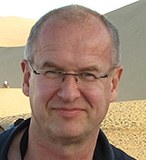 Professor, Vice Dean Olli Varis leads the Water and Development Research Group at Aalto University, Finland.
Professor, Vice Dean Olli Varis leads the Water and Development Research Group at Aalto University, Finland.
We asked Olli Varis to tell us about himself and what water means to him professionally and in everyday life.
What brought you to your current position? I have been working in a multifaceted way on sustainable freshwater management in an array of scales and from various viewpoints over quite a while. Trained as civil engineer, limnologist and systems scientist, I have kept integrating environmental, societal and economic aspects of water in a solution-seeking manner. My professional ambition has been to link scientific rigor with practical relevance, and these both with education of the young generation. A big part of my research and teaching has targeted developing parts of the world, with a focus on Asia.
What do you see as the biggest water-related transboundary challenge? Narrowness and selfishness, be it nationalism, deficiency of responsibility, lack of political will, or disciplinary chauvinism.
What is the added value of international cooperation in solving water-related challenges? International co-operation in terms of knowledge and information sharing, policy integration, cost and benefit sharing etc. should be the baseline in solving water-related challenges. This is most stringent with transboundary waters, but also crucial in all water issues since water problems and solutions are intrinsically shared through the hydrological cycle.
What are the most crucial research needs in terms of emerging pollutants? Addressing the ever-growing knowledge gaps and linking them to policy and public awareness.
What role do lakes and rivers have in your life? As a part of nature as a whole, a source of mental and physical integrity and recreation. I am very quickly lost if I am detached from nature, and cannot for instance follow the seasons of the nature.
